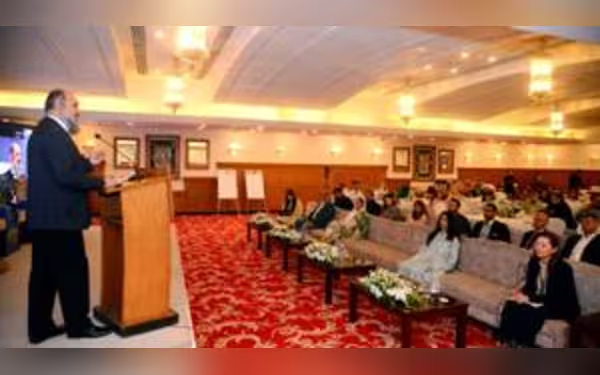Saturday, November 16, 2024 03:20 PM
First IT & E-Commerce Council Meeting in Pakistan
- Council aims to boost IT exports to $25 billion by 2029.
- Challenges include payroll taxes and inadequate internet connectivity.
- New transhipment policy to enhance regional trade and revenue.
 Image Credits: nation_pk
Image Credits: nation_pkThe first IT & E-Commerce Council meeting in Pakistan aims to boost IT exports and address sector challenges for a stronger digital economy.
In a significant move to bolster the growth of Pakistan's information technology (IT) and e-commerce sectors, the first meeting of the IT & E-Commerce Council was held on Thursday, chaired by Federal Minister for Commerce Jam Kamal Khan. This initiative is part of the government's broader strategy to enhance the country's digital economy and increase its global competitiveness.
The meeting took place at the Ministry of Commerce, with Minister of State for IT and Telecommunication Shaza Fatima Khawaja participating virtually. During the session, Minister Jam Kamal Khan urged council members to submit proposals that would be reviewed by the Executive Committee of Commerce, which he chairs. These proposals are crucial as they will be forwarded to the National Export Development Board (NEDB), led by Prime Minister Shehbaz Sharif, for comprehensive decision-making on pivotal issues affecting the sectors.
Shaza Fatima Khawaja emphasized the government's ambitious target to elevate IT exports from $3.223 billion to an impressive $25 billion by the year 2029, as directed by the Prime Minister. She reassured stakeholders that the government would provide all necessary support to achieve this goal. The meeting saw participation from representatives of major e-commerce platforms, including Alibaba, Daraz, and P@SHA, who brought valuable insights into the current landscape.
During the discussions, P@SHA presented a detailed overview of the significant challenges facing the sector. These challenges include payroll taxes, inadequate internet connectivity, and negative global perceptions regarding Pakistan's security, all of which hinder growth. The council also explored potential strategies to enhance regional trade, tackle the issue of brain drain, and foster a robust local IT ecosystem.
Minister Jam Kamal Khan expressed appreciation for the efforts and presentations made by the stakeholders, assuring them of the government's unwavering support. He directed all parties involved to expedite pending matters to ensure the timely implementation of new IT and e-commerce policies. Furthermore, he recommended engaging with the private sector to gain a broader perspective on the challenges and opportunities ahead.
The e-commerce sector has set an ambitious target of reaching $5 billion in exports by 2030. The council underscored that achieving this goal will necessitate strategic improvements in logistics, digital payments, and infrastructure development.
In a related development, Minister Jam Kamal Khan also chaired a high-level meeting aimed at revamping the country’s transhipment policy. This meeting included representatives from various key ministries and stakeholders, focusing on addressing issues such as alternative routes, transhipment modes, and regulatory measures to eliminate obstacles. The overarching goal is to position Pakistan as a regional transhipment hub, facilitating cargo movement for both intra-regional and inter-regional trade, particularly benefiting landlocked countries in the region.
The revised transhipment policy is expected to boost revenue for the Federal Board of Revenue (FBR), create employment opportunities for skilled workers, and spur overall development in the country. Minister Jam Kamal Khan emphasized the importance of consulting the private sector to ensure the policy's effectiveness and directed all stakeholders to expedite pending matters for timely implementation.
The establishment of the IT & E-Commerce Council marks a pivotal step towards enhancing Pakistan's digital economy. With clear targets and a commitment to overcoming existing challenges, the government is poised to create a more conducive environment for growth in the IT and e-commerce sectors. As these initiatives unfold, they hold the potential to transform Pakistan into a significant player in the global digital marketplace, ultimately benefiting the economy and the people of Pakistan.













